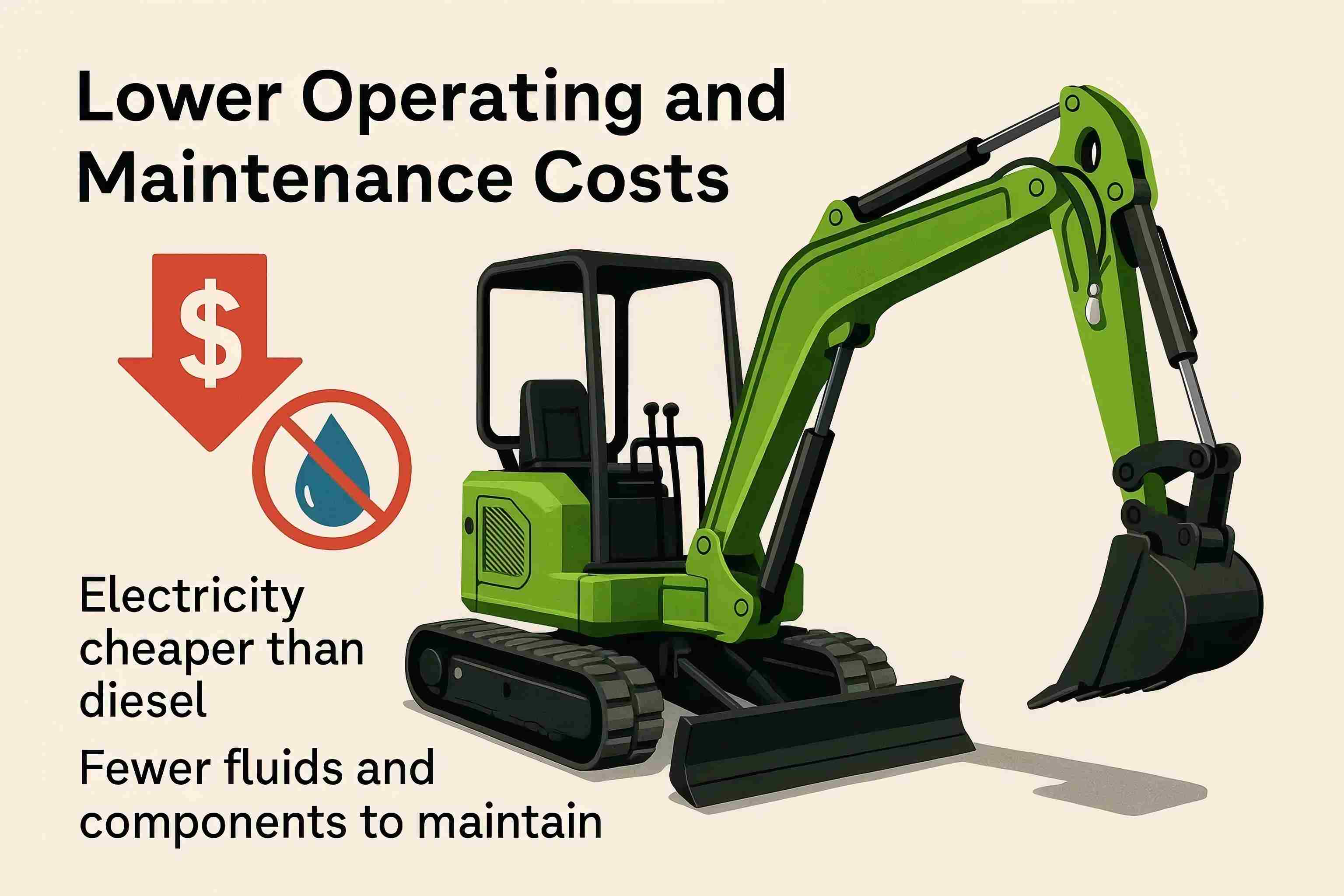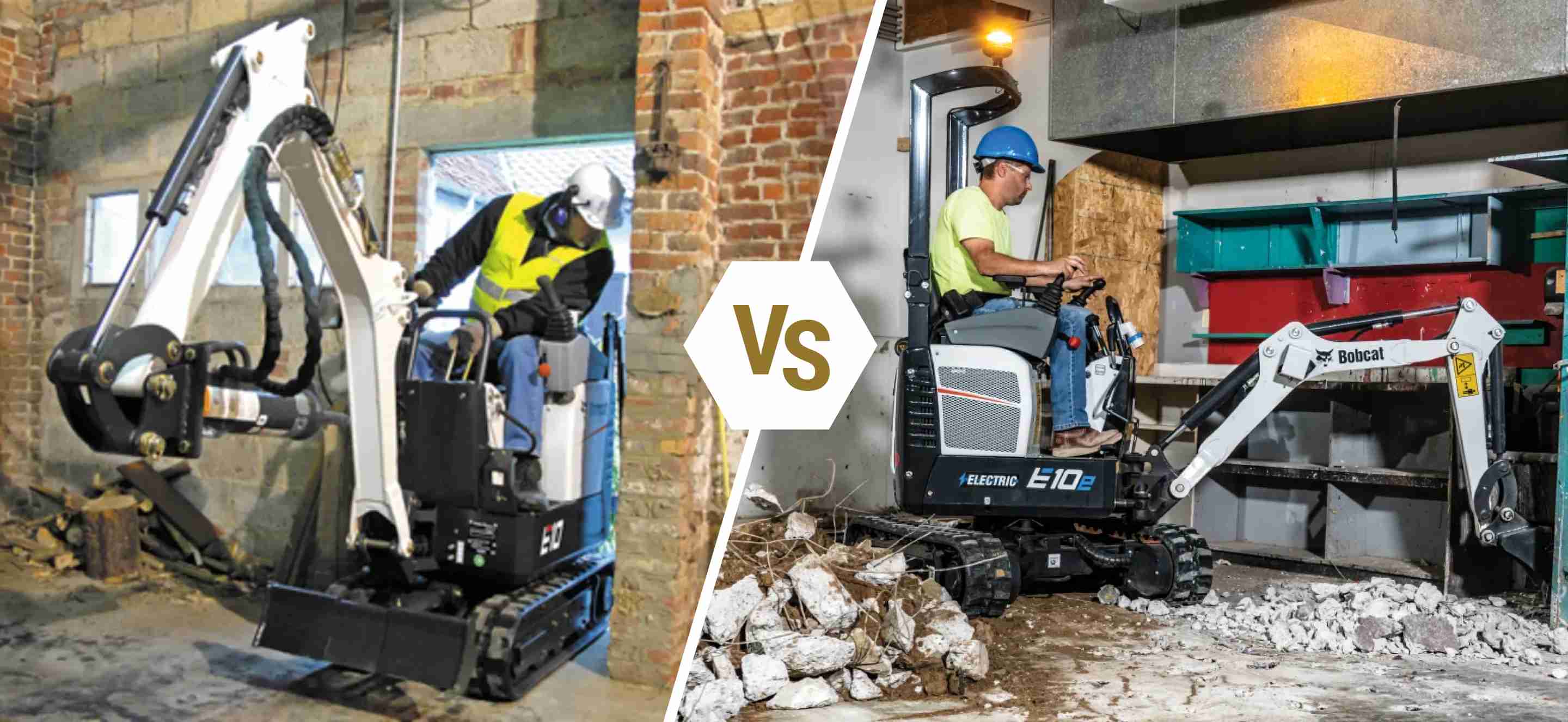Obtenha as últimas informações sobre produtos e informações sobre ofertas
As miniescavadeiras são ferramentas indispensáveis nos canteiros de obras atuais, oferecendo amplas aplicações, desde paisagismo até instalações de serviços públicos. Embora a propulsão a diesel seja o padrão da indústria há muito tempo, miniescavadeiras elétricas estão ganhando destaque rapidamente devido à crescente demanda por sustentabilidade e inovação. Vamos comparar esses dois tipos de máquinas potentes para ajudar você a escolher a mais adequada para seus projetos.
Desempenho e operação
Potência e eficiência: Miniescavadeiras a diesel são conhecidos por sua potência e torque consistentes, tornando-os adequados para tarefas de escavação e elevação de alta intensidade e longa duração, especialmente em áreas remotas. Em contraste, miniescavadeiras elétricas Fornecem torque instantâneo, o que significa que a potência total está disponível imediatamente. Isso é altamente vantajoso para operações que exigem controle preciso e resposta rápida. Com os avanços na tecnologia de baterias, as capacidades de escavação e elevação dos modelos elétricos estão cada vez mais se equiparando, e às vezes até superando, as dos modelos a diesel em determinadas condições.
Tempo de execução e recarga: As escavadeiras a diesel oferecem longos tempos de operação e reabastecimento rápido, o que é muito conveniente para canteiros de obras com infraestrutura de carregamento limitada. O tempo de operação dos modelos elétricos depende da capacidade da bateria e da intensidade do trabalho. No entanto, opções de carregamento rápido e baterias intercambiáveis estão se tornando mais comuns para minimizar o tempo de inatividade. Em áreas onde os custos de eletricidade são menores do que os do diesel, o custo do "combustível" para modelos elétricos também pode ser significativamente menor.

foto do site
Necessidades de manutenção: Os motores a diesel exigem trocas regulares de óleo e filtro e têm mais peças móveis. Miniescavadeiras elétricas têm significativamente menos peças móveis (sem motor, transmissão ou tanque de combustível), o que reduz a frequência e os custos de manutenção, reduzindo trocas de fluidos e falhas causadas por desgaste.
Local de trabalho e impacto ambiental

foto do site
Ruído e vibração: Motores a diesel geram ruído e vibração consideráveis durante a operação. Isso não só afeta o conforto do operador, como também limita seu uso em áreas residenciais ou áreas sensíveis. As miniescavadeiras elétricas operam com praticamente zero ruído. Essa operação silenciosa aumenta significativamente o conforto do operador e as torna a escolha ideal para trabalhos em ambientes internos, parques ou outros ambientes silenciosos.
Emissões e qualidade do ar: Escavadeiras a diesel emitem gases de escape (dióxido de carbono, óxidos de nitrogênio, material particulado) que afetam a qualidade do ar. Miniescavadeiras elétricas não produzem emissões no local, o que é crucial para melhorar a qualidade do ar, especialmente em ambientes internos, túneis ou espaços mal ventilados, onde muitas vezes são a única opção viável. Embora a geração de eletricidade possa gerar emissões, a pegada de carbono geral é significativamente reduzida quando carregada com energia renovável.
Custo de propriedade

foto do site
Embora o preço inicial de compra de miniescavadeiras elétricas seja frequentemente mais alto, seu custo total de propriedade a longo prazo pode ser menor. Isso se deve principalmente aos menores custos de combustível (a eletricidade costuma ser mais barata que o diesel) e à redução significativa das despesas de manutenção. Uma vida útil mais longa do equipamento e subsídios governamentais disponíveis podem reduzir ainda mais os custos.
Incentivos e Regulamentos: Governos em todo o mundo oferecem incentivos (créditos fiscais, subsídios) para incentivar o uso de equipamentos elétricos. Regulamentações de emissões cada vez mais rigorosas também estão levando empresas a migrar para modelos elétricos para evitar multas ou se qualificar para determinados projetos, tornando as máquinas elétricas uma opção mais compatível com as normas para o futuro.
Desafios e Considerações
Mini-Escavadeiras Elétricas: Os principais desafios incluem as limitações da tecnologia de baterias (alcance operacional, desempenho em baixas temperaturas) e a necessidade de infraestrutura de carregamento. O investimento inicial mais alto também pode representar um desafio para algumas empresas.
Miniescavadeiras a diesel: Os desafios contínuos incluem a conformidade com as regulamentações de emissões (exigindo sistemas de pós-tratamento mais complexos), a volatilidade do preço do combustível e as limitações em áreas sensíveis ao ruído.
Conclusão: Fazendo a Escolha Certa
Em última análise, a escolha entre uma miniescavadeira elétrica e uma a diesel depende das necessidades específicas do seu projeto, orçamento e objetivos de longo prazo. Os modelos elétricos se destacam pela compatibilidade ambiental, operação silenciosa e menores custos operacionais, tornando-os ideais para canteiros de obras urbanos ou sensíveis a emissões — eles representam o futuro do setor. No entanto, as máquinas a diesel ainda oferecem vantagens em termos de investimento inicial e operação prolongada em áreas remotas sem infraestrutura de carregamento. Ao tomar sua decisão, certifique-se de considerar seu ambiente de trabalho, as tendências regulatórias, a infraestrutura disponível e os objetivos de sustentabilidade.
Mini Escavadeira Elétrica Opções para sua referência:
📮E-mail: market@ltmg.com
📞WhatsApp/Wechat: +86 19559207570